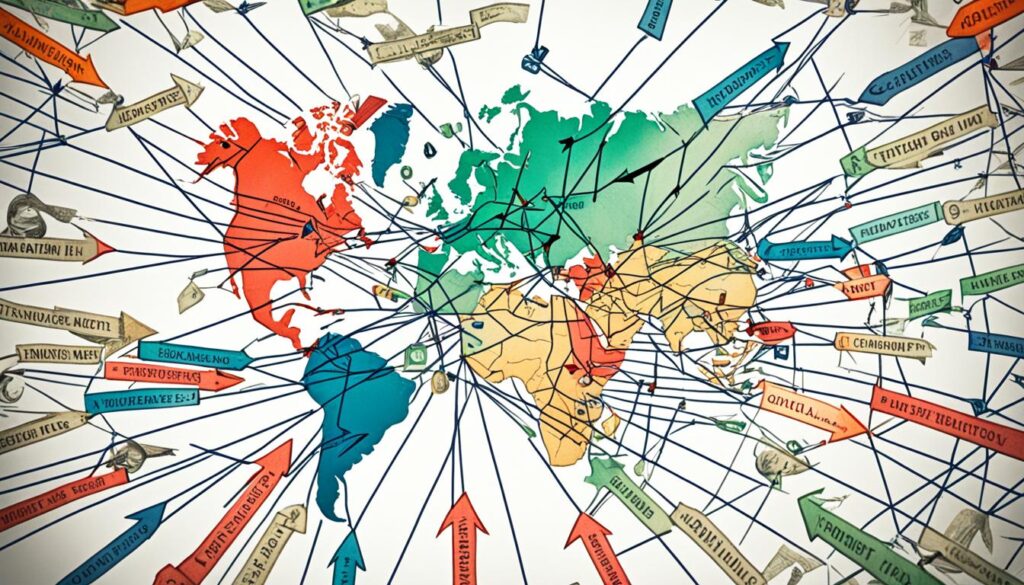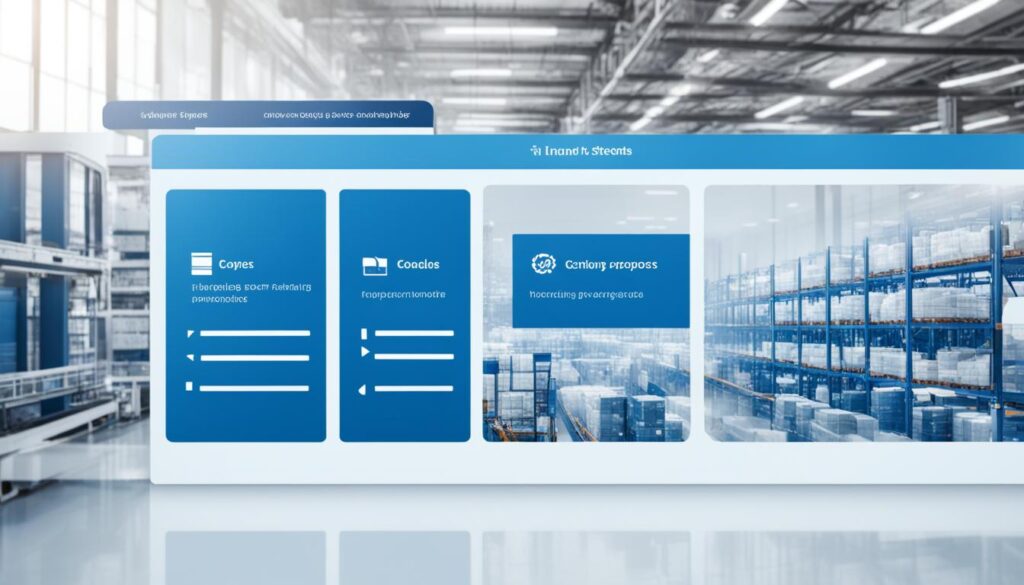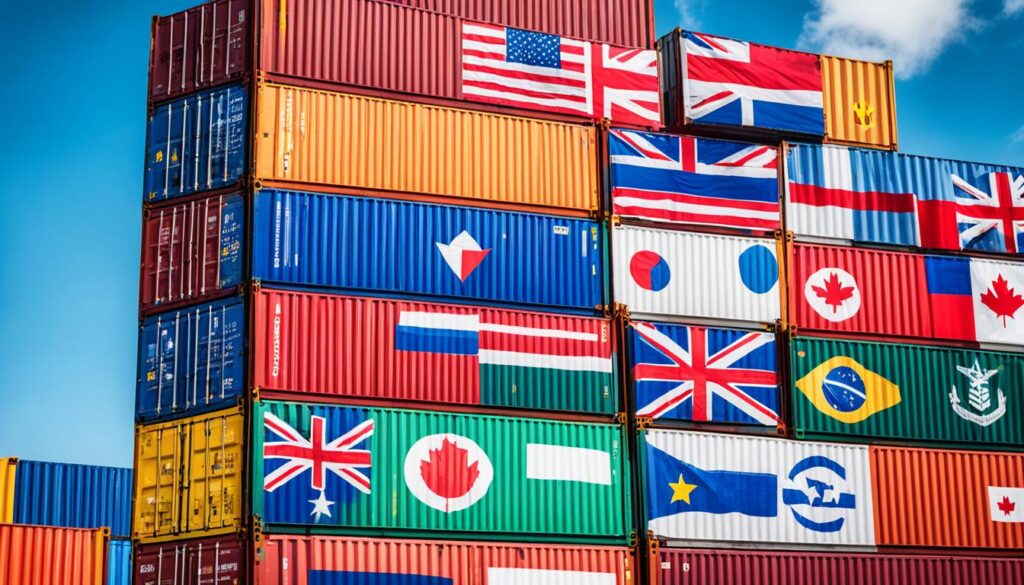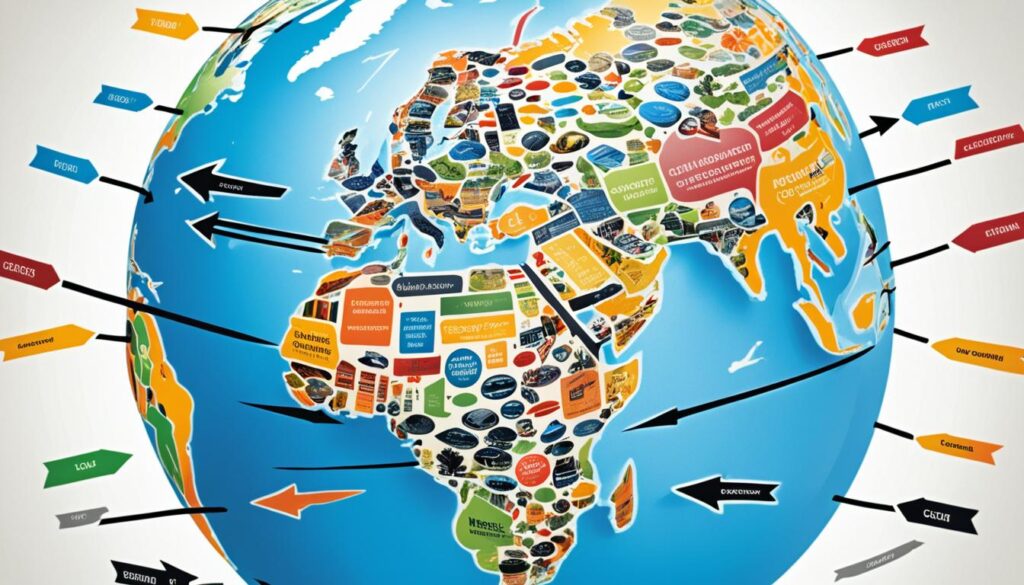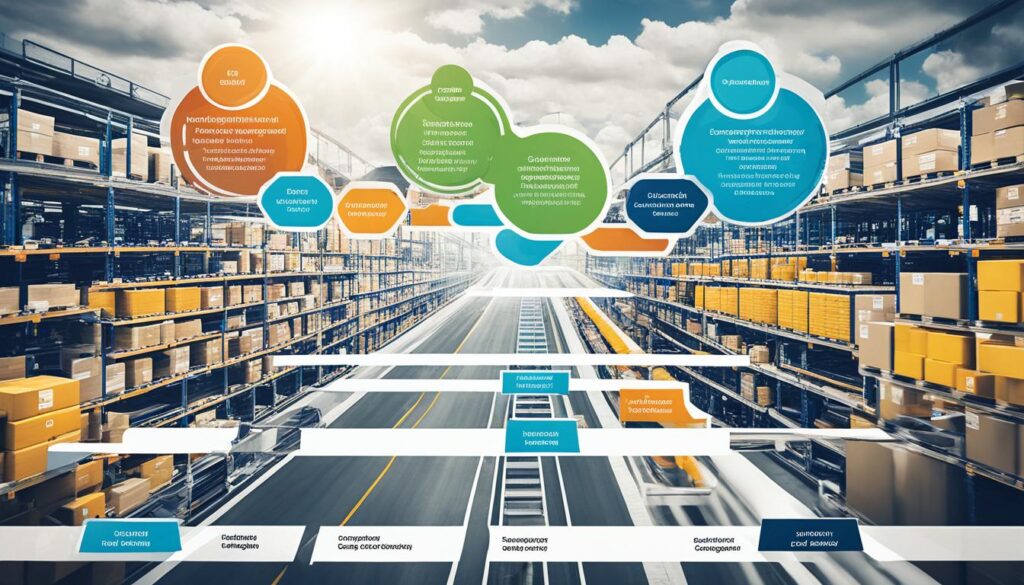Have you ever wondered how trade policies shape the economy? From international trade regulations to import-export policies, trade barriers to tariffs and quotas, trade policies have a significant impact on economic growth, employment, and consumer prices. In this article, we will explore the various aspects of trade policies and their implications for the economy. Let’s dive in and uncover the true influence of trade policies on our economic landscape.
Key Takeaways:
- Trade policies have a profound impact on economic growth, employment, and consumer prices.
- Understanding trade policies is crucial to comprehend their influence on the economy.
- International trade regulations, trade barriers, tariffs, and quotas all play a role in shaping the economy.
- Trade policies can either promote or hinder economic development and integration.
- Exploring the effects of trade policies can help inform and shape future trade strategies.
Challenges of Globalization and Trade
As the world becomes increasingly interconnected, global trade presents both opportunities and challenges. Developing countries, in particular, face numerous hurdles in competing on a global scale. These challenges can hinder economic growth, perpetuate poverty, and limit access to essential resources.
Inefficient systems pose a significant challenge to trade in developing countries. Transportation and customs systems that are slow, costly, and unreliable impede the smooth flow of goods and services. This increases the time and cost of conducting trade, making businesses less competitive in the global marketplace.
Poor connectivity in telecommunications and financial markets exacerbates the challenges faced by developing countries. Limited access to reliable internet services and financial institutions hampers their ability to engage in e-commerce, access global supply chains, and participate in international financial transactions.
Moreover, complicated regulations can be a major barrier to trade. The complex and bureaucratic nature of trade regulations creates uncertainty and increases compliance costs for businesses. This hampers their ability to navigate international trade successfully, discouraging foreign investment and stifling economic growth.
Anticompetitive behavior also poses challenges to trade. Unfair trade practices, such as monopolistic behavior and restrictive market access, limit competition and hinder the entry of new players into the market. This results in reduced opportunities for small businesses and entrepreneurial ventures to grow and thrive.
Increasing trade can also have distributional consequences. While trade can bring overall economic benefits, workers in import-competing industries may face wage declines or even unemployment, leading to increased income inequality. It is essential to manage the transition and create inclusive policies that mitigate these distributional consequences.
“Inefficient transportation and customs systems, poor connectivity in telecommunications and financial markets, complicated regulatory environments, and anticompetitive behavior all present real barriers to trade, particularly for developing countries. Addressing these challenges and ensuring inclusive trade policies are crucial for fostering economic growth and reducing poverty.” – World Bank Group
Connecting People and Markets
Efforts to address these challenges are essential for unlocking the full potential of globalization and trade. By investing in modernizing transportation and customs systems, developing countries can improve the efficiency and reliability of their trade infrastructure. Enhancing connectivity through investments in telecommunications and financial technologies enables businesses to participate fully in the global economy.
Simplifying and harmonizing trade regulations can significantly reduce compliance costs and trade barriers. By streamlining procedures, implementing transparent regulations, and modernizing customs processes, countries can facilitate the smooth movement of goods and services across borders.
Additionally, fostering fair competition through robust legal frameworks and effective competition policies is crucial. By promoting a level playing field and discouraging anticompetitive behavior, countries can create an environment that encourages innovation, entrepreneurship, and market access for all.
Addressing the distributional consequences of increasing trade requires comprehensive and inclusive policies. This includes investing in education and skills development, supporting workers in transition, and creating opportunities for entrepreneurship and small business development.
| Challenges | Impact |
|---|---|
| Inefficient systems | Higher transportation costs, delays in trade |
| Poor connectivity | Limited access to global markets and financial services |
| Complicated regulations | Increased compliance costs, reduced foreign investment |
| Anticompetitive behavior | Restricted market access, limited competition |
| Distributional consequences | Income inequality, job displacement |
Key Strategies in Trade Policy
When it comes to trade policy, there are several key strategies that governments and organizations employ to promote trade facilitation, drive logistics efficiency, manage borders effectively, and foster trade agreements that enable global collaboration. These strategies play a crucial role in enhancing trade and competitiveness, promoting economic growth, and creating opportunities for countries to integrate into the world economy.
1. Trade Facilitation
One of the fundamental strategies in trade policy is trade facilitation, which aims to streamline and simplify the processes, procedures, and documentation required for the movement of goods across borders. By reducing red tape, bureaucracy, and unnecessary barriers, trade facilitation enables smoother and more efficient trade flows. This not only benefits businesses by reducing costs and speeding up delivery times, but it also enhances market access for countries and promotes international trade.
2. Logistics and Supply Chain Management
Efficient logistics and supply chain management are essential for the smooth movement of goods from producers to consumers. This includes optimizing transportation networks, improving warehouse and inventory management, and enhancing coordination among different stakeholders involved in the supply chain. By implementing effective logistics strategies, countries can reduce costs, enhance competitiveness, and ensure timely delivery, which are crucial factors in promoting trade.
3. Border Management
Managing borders effectively is vital for facilitating trade while ensuring compliance with regulatory requirements. This involves implementing efficient customs procedures, enhancing border infrastructure and technologies, and harmonizing regulations to streamline the movement of goods across borders. Effective border management reduces delays, promotes transparency, and enhances security, creating a conducive environment for trade and economic growth.
4. Trade Agreements
Trade agreements play a significant role in shaping trade policies and promoting international economic cooperation. These agreements establish rules and standards that govern trade between countries, reduce trade barriers, and provide a framework for resolving disputes. By negotiating and implementing trade agreements, countries can unlock new market opportunities, enhance market access for their goods and services, and promote fair and sustainable trade.
5. Trade and Competitiveness
Emphasizing trade and competitiveness in national development strategies is crucial for countries seeking to enhance their economic growth and position in the global market. This involves implementing policies that foster innovation, promote entrepreneurship, develop human capital, and improve infrastructure. By investing in trade-related capacities and competitiveness, countries can attract investment, expand their export base, and create jobs, leading to sustainable economic development.
6. Aid for Trade
To assist developing countries in integrating into the world economy, aid for trade programs provide financial and technical support. These programs aim to enhance trade-related infrastructure, improve trade facilitation capacities, and build the skills and capabilities necessary to participate in global value chains. Aid for trade initiatives help level the playing field and promote inclusive trade, benefiting countries that face challenges in competing on a global scale.
7. Markets and Competition Policy
Creating open and competitive markets is vital for promoting trade and ensuring fair competition among businesses. Competition policy focuses on preventing anticompetitive practices, such as monopolies or cartels, which can hinder trade and limit consumer choice. By fostering competition, countries can stimulate innovation, improve efficiency, and create an enabling environment for businesses to thrive.
By implementing these key strategies in trade policy, countries can overcome challenges, enhance trade facilitation, and promote economic growth and development. These strategies contribute to creating a favorable trade environment where businesses can compete globally, consumers benefit from a wider range of affordable products, and nations can leverage trade as a driver of prosperity.
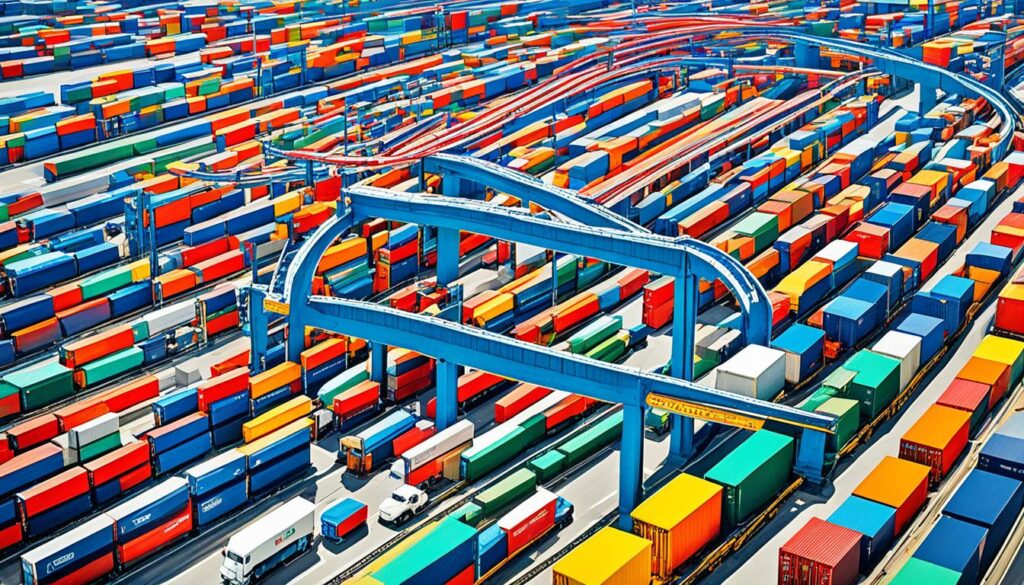
The Role of the World Bank Group
The World Bank Group plays a crucial role in supporting an open, rules-based trading system and providing valuable trade advisory and support work. Through its efforts, the World Bank Group aims to enhance trade competitiveness, implement trade facilitation measures, and provide trade financing, with the ultimate goal of improving access to developed country markets and promoting inclusive trade integration.
The World Bank Group recognizes the importance of an open trading system in fostering economic growth and reducing poverty. By advocating for fair and transparent trade practices, the organization works to create a level playing field for countries of all levels of development, ensuring that trade benefits are widely shared.
“An open trading system is vital for sustainable and inclusive economic growth. The World Bank Group is committed to supporting countries in their efforts to remove trade barriers and strengthen their trade competitiveness.”
To achieve these objectives, the World Bank Group provides trade advisory and support work to countries, sharing its knowledge and expertise to help them navigate the complex international trade landscape. This includes offering guidance on trade policies, regulations, and agreements, as well as assisting with the implementation of trade facilitation measures to streamline cross-border trade processes.
Furthermore, the World Bank Group recognizes that access to trade financing is crucial for countries, particularly developing ones, to fully participate in global trade. It provides financial support to help countries address trade finance gaps and ensure that trade flows smoothly.
The World Bank Group’s trade advisory and support work includes:
- Providing technical assistance to countries in enhancing their trade competitiveness
- Advising on trade facilitation measures to streamline customs procedures and reduce trade barriers
- Assisting in the implementation of trade agreements to ensure compliance and maximize benefits
- Supporting countries in accessing trade financing to facilitate trade transactions
The World Bank Group’s commitment to an open trading system and its trade advisory and support work are essential in promoting economic growth, reducing poverty, and fostering global trade integration.
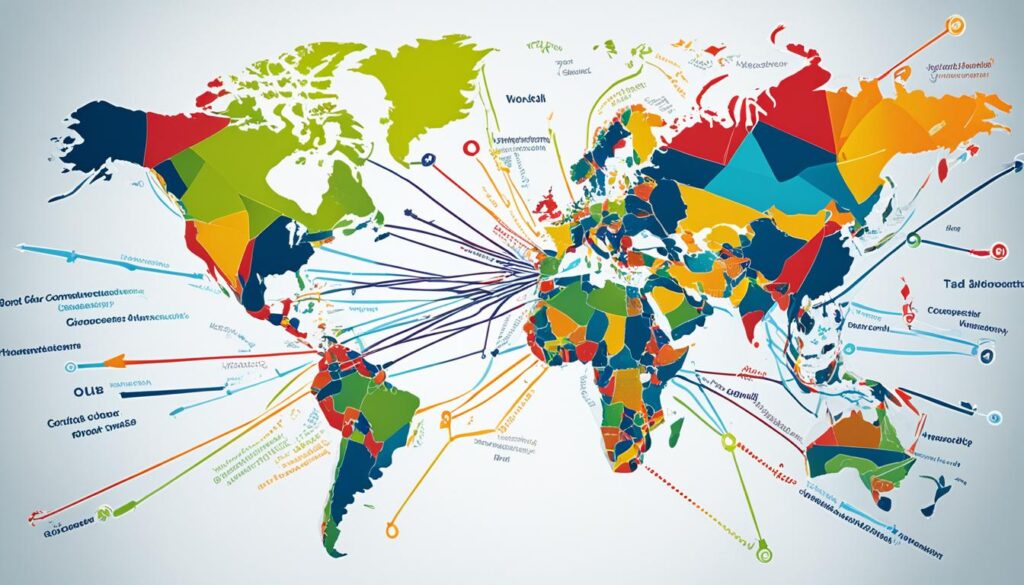
Key Takeaways:
- The World Bank Group supports an open, rules-based trading system.
- It provides trade advisory and support work to enhance countries’ trade competitiveness.
- The World Bank Group assists in implementing trade facilitation measures.
- It offers trade financing to support smooth trade transactions.
- The organization’s efforts aim to improve access to developed country markets and promote inclusive trade integration.
Results of Trade Advisory and Support Work
The World Bank Group’s trade projects and engagements have yielded positive results. Through its trade advisory and support work, the World Bank Group has contributed significantly to enhancing trade competitiveness, reducing trade barriers, and improving trade operations worldwide. These efforts have created an improved business environment that fosters economic growth and development.
For instance, in Bosnia and Herzegovina, the World Bank’s support for trade-related reforms has resulted in a substantial reduction in administrative costs associated with trade. This has not only streamlined trade processes but has also strengthened the country’s trade competitiveness on the global stage.
Similar positive outcomes have been observed in other countries, including Macedonia and Indonesia. The World Bank’s engagement in trade projects has led to the reduction of trade barriers, enabling these nations to expand their international trade activities and reap the associated economic benefits.
“The World Bank’s trade advisory and support work has made a significant impact on promoting trade and improving economic opportunities. This has allowed countries to overcome trade barriers, enhance their trade competitiveness, and ultimately contribute to poverty reduction and inclusive growth.”
These accomplishments highlight the effectiveness of the World Bank Group’s efforts in fostering an enabling business environment that encourages trade and economic prosperity. By reducing trade barriers and promoting trade competitiveness, the World Bank Group’s trade advisory and support work has paved the way for enhanced trade engagement, improved market access, and increased economic opportunities for countries across the globe.
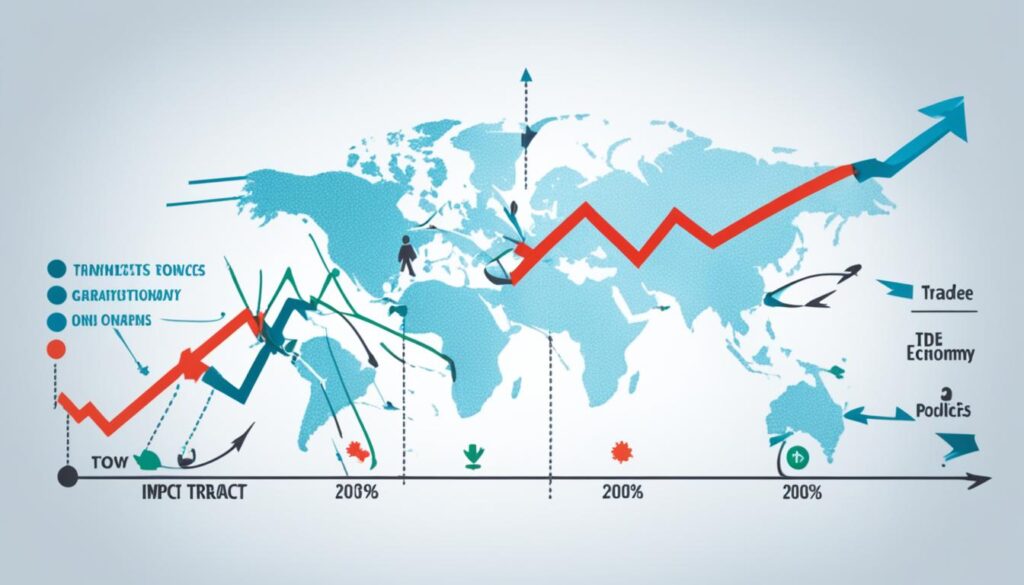
Key Results of the World Bank Group’s Trade Advisory and Support Work:
- Enhanced trade competitiveness
- Reduction in trade barriers
- Improved trade operations
- Creation of a more favorable business environment
Bank Group Contribution to Trade Development
The World Bank Group plays a crucial role in supporting trade development through its financing and assistance programs. By providing essential resources, the Bank Group helps countries integrate into the global economy and promotes economic growth.
As the largest provider of Aid for Trade, the World Bank Group assists developing countries in enhancing their trade capacities. This support includes providing financial resources, technical expertise, and advisory services to help nations overcome trade-related challenges.
The Bank Group’s initiatives, such as the Umbrella Facility for Trade and the Trade Facilitation Support Program, further contribute to trade development. These programs offer funding and assistance specifically designed for trade-related projects, helping countries improve their trade facilitation processes and promote efficient cross-border trade.
Through Bank Group financing and trade support, nations can address trade barriers, enhance their competitiveness, and achieve sustainable economic development. The collaboration between the Bank Group and countries seeking to expand their trade capabilities is essential in ensuring a more inclusive and integrated global trade system.

Key Contributions to Trade Development:
- Provision of Aid for Trade
- Support for trade facilitation programs
- Financial assistance through the Umbrella Facility for Trade
- Trade advisory services and technical expertise
“The World Bank Group’s commitment to trade development has made a significant impact on countries’ ability to engage in international trade and reap its benefits. By providing the necessary resources and support, the Bank Group has helped nations overcome trade barriers and achieve economic integration.” – Trade Minister, Country XYZ
Perspectives on Free Trade
The concept of free trade is a cornerstone of modern economic theory, championed by renowned economist Adam Smith. Free trade advocates emphasize the benefits of specialization and comparative advantage, highlighting the potential for increased productivity and economic growth.
By allowing nations to focus on producing goods and services in which they have a relative advantage, free trade creates an environment that fosters innovation, efficiency, and economic prosperity. This approach encourages countries to specialize in industries where they can excel, resulting in higher-quality products and lower costs for both producers and consumers.
However, the theory of free trade has faced challenges over the years, with some proponents of protectionism advocating for trade policies that protect domestic industries and workers. Protectionist measures such as tariffs, quotas, and subsidies aim to shield domestic producers from foreign competition.
While protectionism may seem appealing in the short term, it can hinder overall economic growth and development. Trade barriers can lead to higher prices for consumers, reduced product variety, and a decline in international competitiveness. Additionally, protectionism runs the risk of igniting trade wars, limiting market access, and stifling innovation.
Understanding the different perspectives on free trade is crucial when formulating trade policies. Policymakers must carefully weigh the potential benefits of free trade against the arguments put forth by protectionist proponents. By engaging in informed debates and considering relevant economic factors, countries can make well-informed decisions that promote long-term economic growth and shared prosperity.
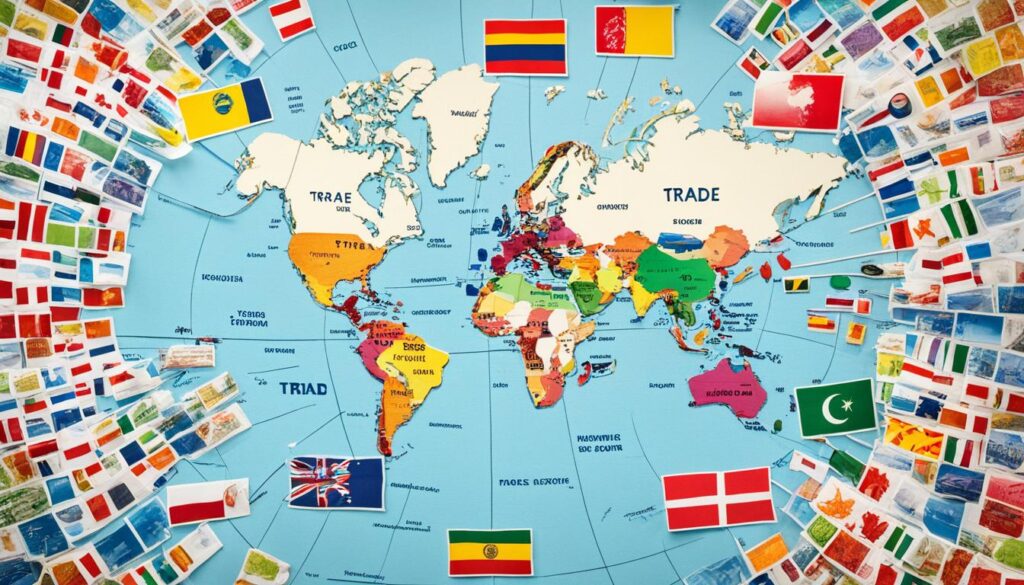
->___TABLE___
The Economic Impact of Tariffs
Tariffs are trade barriers that impose taxes on imported goods, resulting in higher prices for consumers and reduced quantities of goods available in the market. When tariffs are implemented, they increase the cost of imported products, making them more expensive for consumers. As a result, consumers either have to pay higher prices for the same goods or reduce their consumption due to affordability constraints.
These higher prices can have several economic consequences. First, they directly impact consumers’ purchasing power by reducing their disposable income. When consumers have to spend more money on imported goods, they have less money available for other spending and saving activities. This reduction in consumer spending can result in lower economic growth and slower economic development.
Furthermore, tariffs can also lead to a reduced quantity of goods available in the market. When imported goods become more expensive, there is a decrease in demand for those goods. This reduced demand can affect businesses, especially those that rely heavily on imports for their production processes. As a result, businesses may face lower revenues and reduced employment opportunities.
The consequences of tariffs extend beyond consumer prices and employment. Slower economic growth can impact investment decisions, leading to a decrease in capital formation. This reduction in investment can hinder the expansion of businesses, limit technological advancements, and constrain innovation. Ultimately, these economic consequences can have long-term effects on a country’s competitiveness and overall economic welfare.
The Impact of Tariffs on the Economy:
- Higher prices for consumers
- Reduced quantity of goods available
- Lower income and reduced employment
- Slower economic growth
Understanding the impact of tariffs is crucial for policymakers and economists when evaluating the effectiveness of trade barriers and considering potential drawbacks. It is essential to balance the goals of protecting domestic industries with the potential negative consequences that tariffs may have on consumers, businesses, and overall economic growth.
Recent Developments in U.S. Trade Policies
The United States has recently implemented tariffs on various goods, including solar panels, washing machines, steel, and aluminum. These tariffs have been part of the Trump administration’s efforts to address trade imbalances and protect domestic industries. In addition to these tariffs, the United States has engaged in trade disputes with China, imposing additional tariffs on Chinese goods in response to alleged unfair trade practices.
One of the major trade disputes between the United States and China is centered around intellectual property rights violations and forced technology transfers. As a result, the United States has imposed tariffs on a wide range of Chinese imports. The ongoing trade disputes between the two countries have intensified the debate over the effectiveness of protectionist trade policies in achieving desired outcomes.
Furthermore, the Trump administration is considering imposing additional tariffs on Chinese imports and automobile imports, which has further escalated trade tensions. These developments have raised concerns about the potential negative consequences of protectionist trade policies, including higher prices for consumers, reduced trade flows, and possible retaliatory measures from affected countries.
In response to these recent developments in U.S. trade policies, various stakeholders, including businesses, economists, and policymakers, have voiced their opinions. Some argue that protectionist measures aim to safeguard domestic industries and jobs, while others contend that such policies can lead to unintended negative consequences, such as reduced global trade and economic growth.
As the United States navigates these complex trade policy issues, it is essential to carefully evaluate the potential short-term and long-term impacts of these measures on both domestic and global economies. The outcomes of these trade policies will continue to shape the international trade landscape and have implications for businesses, consumers, and future trade negotiations.
The Importance of Promoting Free Trade
Policymakers and economists emphasize the numerous benefits of promoting free trade. Free trade plays a crucial role in driving economic growth, fostering innovation, and benefiting consumers by offering lower prices and a wider range of choices. By advocating for policies that support and enhance free trade principles, we can ensure long-term economic prosperity.
Free trade has a positive impact on economic growth as it stimulates competition among businesses. When countries open their markets to international trade, it encourages domestic industries to become more efficient and innovative to stay competitive. This increased competition contributes to overall economic growth and productivity.
One of the major benefits of free trade is the impact it has on consumer prices. When countries remove trade barriers and reduce tariffs on imported goods, consumers can access a wider variety of products at lower prices. Competition from foreign markets forces domestic producers to price their goods competitively, resulting in cost savings for consumers.
Moreover, free trade promotes healthy competition within domestic markets. When countries engage in international trade, they expose their domestic industries to global competition. This competition spurs innovation as businesses strive to develop new and better products to gain a competitive edge. Ultimately, this drive for innovation contributes to the overall advancement and development of industries.
By advocating for policies that support and enhance free trade principles, we can ensure long-term economic prosperity.
Throughout history, free trade has been a catalyst for innovation. When countries engage in international trade, they have access to a wider pool of ideas, technologies, and expertise. This exchange of knowledge and resources fosters innovation and drives technological advancements that benefit society as a whole. From the Industrial Revolution to today’s digital revolution, free trade has played a significant role in driving innovation and progress.
By prioritizing and promoting free trade, we can harness its many benefits and ensure a thriving global economy. Governments, businesses, and policymakers must work together to remove trade barriers, negotiate fair trade agreements, and create an environment that fosters innovation and competition. Embracing the principles of free trade will pave the way for sustainable economic growth and a brighter future.
| Benefits of Free Trade | Description |
|---|---|
| Economic Growth | Promotes competition and stimulates productivity, leading to overall economic growth. |
| Consumer Prices | Allows consumers to access a wider variety of goods at lower prices. |
| Competition | Spurs innovation and drives businesses to develop new products and services. |
| Innovation | Facilitates the exchange of ideas, technologies, and expertise, driving technological advancements. |
Moving Forward with Trade Policies
As we look to the future of trade policies, it is crucial that we focus on trade liberalization as a means to promote economic growth and poverty reduction. By embracing open trade and reducing trade barriers, nations can unlock the potential for increased economic development and shared prosperity.
Trade liberalization plays a vital role in stimulating economic growth by fostering competition, encouraging innovation, and creating market opportunities for businesses. By removing restrictions on international trade, countries can access a wider range of goods, services, and technologies, leading to increased productivity and efficiency.
In addition to driving economic growth, trade liberalization has the potential to alleviate poverty. By expanding market access and promoting inclusive trade integration, developing countries can tap into global value chains, create new job opportunities, and improve living standards for their citizens.
However, achieving these goals requires a collective effort from policymakers and stakeholders. It is essential for governments to prioritize reducing trade barriers, improving trade facilitation measures, and strengthening global trade agreements to ensure a level playing field for all nations. By doing so, we can pave the way for a future where trade policies contribute to sustainable economic growth and poverty reduction.
